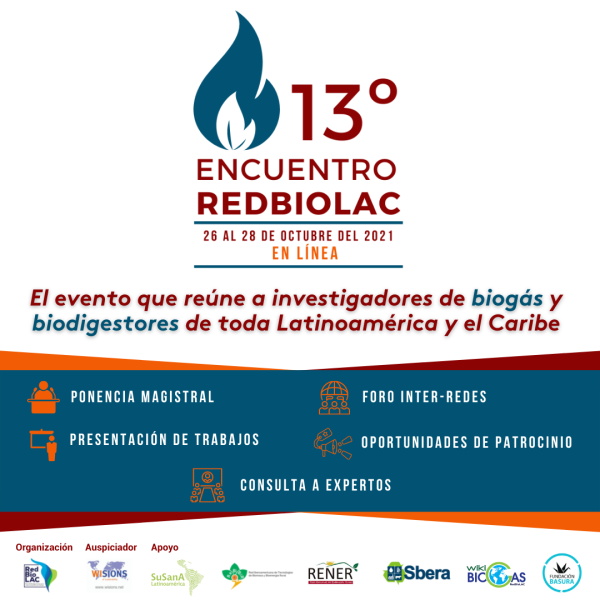In Trelew, Chubut, the students from the local Technical School have installed a new wind-solar hybrid system, capable of providing opportunity for energy self-sufficiency in the rural community.
13th Encuentro of RedBioLAC
Our regional partnership network RedBioLAC held their 13th Encuentro (Annual Meeting) from the 26th to 28th of October. It took place as an online event due to COVID and was broadcasted live. The goal was to share expertise as well as practical advice about the implementation, long term success and potential of biogas and biodigesters for Latin America and the Caribbean.Minimize
For more detailed information about the Encuentro visit their Website.
One aspect, that ran through the event was the question what role the local communities play for the long term success of biodigesters. It was stated that the active involvement of locals from the start is a necessary step to establish an acceptance of the technologies. This is vital, because the local communities are usually involved in maintaining the structures and therefore guarantee the longevity of the technologies. To achieve this acceptance, biodigester implementation must focus on the individual needs as well as the specific socioeconomic, cultural and technical conditions. This is especially relevant for the implementation of domestic biodigesters, who are a promising technology due to their relatively low consultancy cost.
At the same time, the empowering potential of biodigesters for women was highlighted e.g. by the good practice example of the implementation of more than 18,000 biodigesters in Burkina Faso, Kenya, Ethiopia, Tanzania and Uganda. Women played a vital role in the adoption and extensive training for users, technicians, masons and supervisors to ensure quality control of biodigesters. To fulfill the empowering potential in those technologies, it needs public policy support, which also allows for a wide dissemination.
Besides the socioeconomic aspects, the event also discussed the technical side of biodigesters. The intertwining of production processes and biodigesters, a revaluation of waste and wastewater treatment plants were highlighted cornerstones on the way towards a circular bio economy. Also highlighted was the technology of anaerobic waste systems that provide sustainable energy as well as nutrients, while being relatively low cost and therefore are a viable option especially in rural areas.
If you want to learn more about one of the topics, you can rewatch the entire Encuentro on YouTube!


